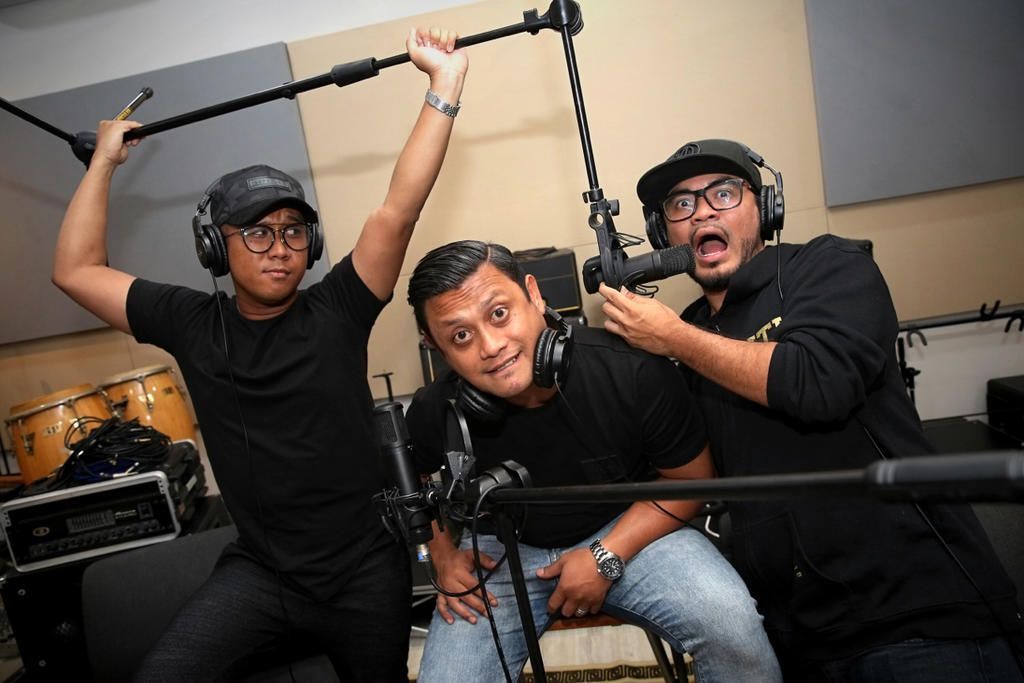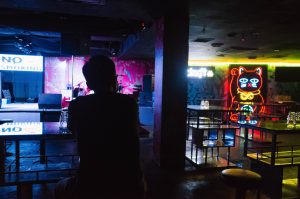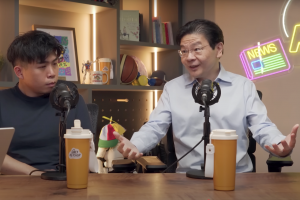Famous Spotify podcast stars of OKLETSGO (OLG) have been accused of propagating misogynistic content in their series. On 15 June, President Halimah Yacob asked the channel’s three DJs to apologise for objectifying and debasing women. On his Facebook post, one of the DJs, Dzar Ismail, complied. But we dug a little deeper to find out why the podcast has generated so much controversy, and what its wide appeal says about Singaporean attitudes towards gender and equality.
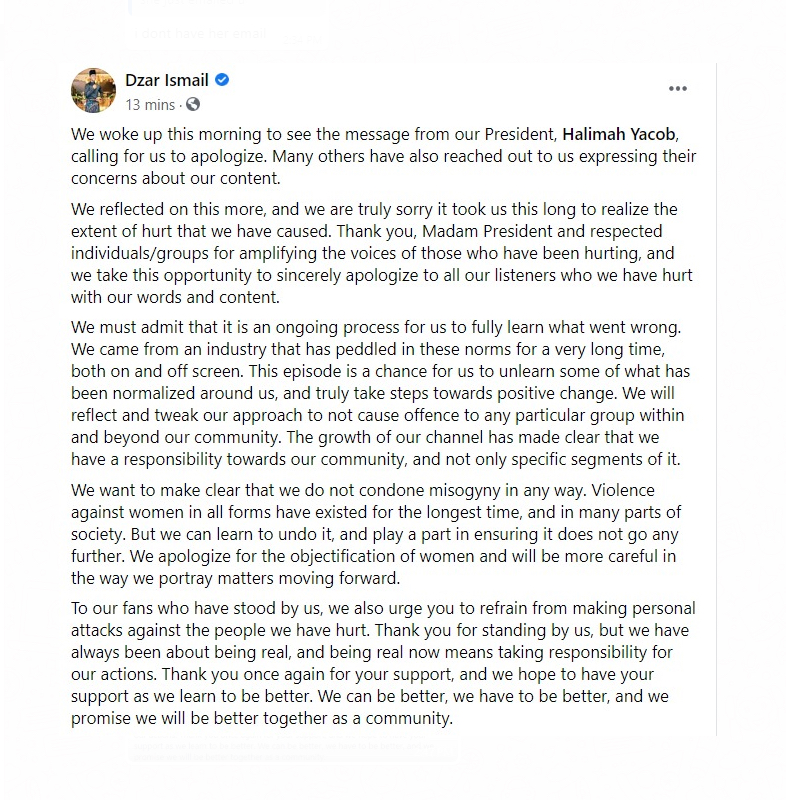
Mainstream media reported on its popularity, but reaction from women in the Malay community was considerably less enthusiastic.
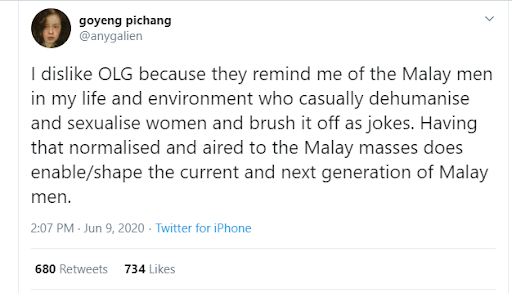
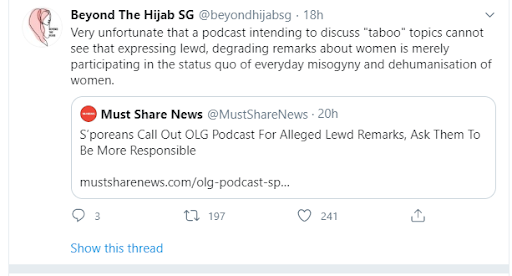
Here are some of the podcast’s most troubling episodes.
(1) Part 3: SG Nasi Lemak
The podcast episode starts with a podcaster exclaiming, “Vagina, vagina, vagina, vagina” as nothing more than an arbitrary reason to include an explicit joke. Following a shoutout to their fans, the DJs mentions their ‘makcik’ and ‘pakcik’ fans (usually used to refer to elderly men and women in the Malay community), highlighting that their podcast was only for entertainment and that listeners should only listen to the parts that they like and ignore the parts they don’t.
This seems to be the three DJs’ general approach to justify their chauvinistic content.
The episode SG Nasi Lemak hones in on a private Telegram group of 44,000 members, which serves as a platform to share pornography and solicit of sexual services from women. The DJs variously question the quality of these women, referring to the virgins as ‘fresh meat’ and the rest as ‘stale meat’. They describe theTelegram group and share with listeners that the group allows the trading of local pornographic videos whose content can be customised.
There is a passing reference to the ‘pakcik-pakcik’ (a group of elderly men) disseminating links to articles promoting the purchasing of Russian and Syrian wives.
This theme of excusing men for using services that exploit women as a necessity continues through the entire episode. At no point did any of the podcasters address the dangers of sex trafficking and human exploitation with regards to social escorts and illegal prostitution rings. One podcaster clarifies that he was not advocating the use of brothels but raises the possibility of having a legal digital version, to provide for thesexual needs of some men. After a surface level attempt to tackle the social issues around the idea, one podcaster started making pun jokes around the word ‘whore’ in the spirit of entertainment. This went on for about a solid minute. This is the podcast channel’s idea of tackling “controversial” or “secular” content.
(2) Part One: The Perfect Wife
This podcast episode is the first of a 3-part podcast interview. The title ‘The Perfect Wife’ was chosen to describe the guest of this podcast, Sarah, who enjoys sexual activities involving role-playing and had the compelling need to constantly satisfy her husband sexually.
Only 16 minutes into the episode, a sinister toxic masculinity can be seen at play.
The episode introduces Sarah by first focusing on her ex-husband’s attraction to cuckolding. Again, they pose questions like “Why does he like to kill his ego?” and “What if that someone else’s dick is bigger than his?” Forget that their interviewee was Sarah; they concluded their introduction by saying that it was time to “try to delve deeper” in order to understand the psychology behind the cuckolding fetish because “he”, the ex-husband, “has a compelling story to tell”.
They discuss the different role-play scenarios that Sarah enjoys. One podcaster exclaimed, “RAPE SCENE! RAPE SCENE!” to which Sarah replied, “Yeah, I kinda like that too.” None of them seemed to be particularly troubled by this suggestion, nor did the podcasters feel the need to address this confession. Instead, they continued with their discussion of Sarah’s fetishes, unperturbed, despite acknowledging that they could see her “grappling” with her emotions when she was reliving her past to them outside of the podcast.
(3) Part Two: Keinginan Suami
In this episode, Sarah describes how her ex-husband forced her to visualise him as physically different, often while they were having sex. This led to her eventual mental breakdown. During this recollection, one of the podcasters posed the idea that she might have been an enabler by being silent. Another DJ decided that it was a great time to make a dirty pun joke around the word ‘play’ alluding to ‘bo-pleh’ (testicles).
This complete lack of compassion continued when Sarah explained that she held herself accountable for the torture she has had to endure, claiming that it was the result of her “pampering” the ex-husband by giving in to his every whim. One podcaster asked in full confusion, “How is that pampering though?” referring to her giving her husband anything he wanted. Then, after summarizing their understanding of the situation, he questioned again, as if struggling to fathom, “Are you saying that by depriving him of the things that he wants, you would have made him a more mellowed person than he is right now?” Both questions disturbingly insinuate that the podcasters deem it a necessity for a husband’s wants to be fulfilled by his wife.
The episode then moved on to Sarah recalling her experience going to a Swingers party in Amsterdam. She revealed a very alarming reason for deciding to experience the culture. She felt that she had to entertain her husband’s fetish just once in order to get him to stop forcing the idea on her. “I was just hoping that if it happens, that he would stop”, explained Sarah. She then continued to recall a party incident where she was almost a victim of sexual assault with the ‘permission’ of her husband. The podcasters responded to this by asking her what she was wearing, explaining that this was “important” information for them to better visualize the scene. One podcaster guessed, “Miniskirt?” which sparked a reaction of “Ooh! I like that!” from another podcaster. The podcasters continued to demand specific details about the incident.
(4) Part Three: Selamat Tinggal
They began the last part of Sarah’s podcast interview by thanking her for sharing her story. “You coming out and sharing all these would empower many more to probably ‘DM’ us,” said one of the podcasters. At this point, Sarah had already shared the mental torture she has had to endure. She sat through at least 2 hours of reliving her traumatic past to three men who were more interested in visualising her sexual encounters, than in making sense of why such abuse or inequality persists in marriages. Sarah had been debased many times throughout this podcast interview, and yet, the podcasters deem it essential for this story to be told to empower other women to, not stand up for themselves, but instead share the story with OKLETSGO.
Sarah continued detailing the deterioration of their relationship. The ghastly attitude towards rape was again apparent when Sarah referred to having sexual intercourse with her husband in the midst of their divorce, describing it as “raping”. Finally, she went on to describe the first time she was violently raped by her ex-husband. Thepodcasters don’t address the fact that it might be traumatic to share these details. Instead, they ask her if she was “dahaga (thirsty)” (referring to her sexual appetite) and expressed genuine concern that she would never find a future sex partner to match up to her rapist.
And as though this revelation was not shock value enough, the podcasters made Sarah face her perpetrator through a role-playing scenario . Sarah had a breakdown in the middle of the roleplay but the podcaster continued acting as her ex-husband, begging for her to take him back. Though he apologised when the acting scene concluded, he justified putting her through that ordeal by saying that it would help her address the emotions she had been bottling up.
Fans AKA “Blood” Are Missing The Point
The accusations towards the team have seen fans (more affectionately known as “Blood”) coming quickly to their defense, with the general opinion being that these accusations are oversimplified, exaggerated and fail to consider that some of OLGs content is educational. Or that they’re just a group of men keeping things real and joking around—it’s all just locker room talk.
The premise of OLGs podcasts are great and have the potential to unmask a lot that is happening in the community and society as a whole, which isn’t talked about in the mainstream.
But the podcast fails in the execution of its content. The informal approach helps to build rapport with the audience, but its creators are not governed by sensitivity or respect for the subject matters, or for their guests.
The most important critique that the “Blood” have failed to understand here is the lethal combination of OLG’s depth of influence on their community of listeners and the normalisation of hate speech. Locker room talk, by its very definition, takes place in small groups, in private spaces. By broadcasting and disseminating the often prejudicial, sexist and misogynistic things men might say among close friends, OLG’s creators are essentially legitimising the debasement of women. What that adds up to is a toxic platform with over 100,000 listeners. The podcast’s creators have the power to control a narrative and shape the views of others and doing this irresponsibly can lead to dire consequences.
Are They Truly Open-minded?
The open-mindedness that they pride themselves on seems to be lacking in their approach towards criticism. “We OLG will stand strong on our stand and WILL NOT APOLOGISE TO THOSE YOUNG F*CKS!!!” hardly sounds like these men sincerely “appreciate[d] the constructive feedback” and more like the statements of individuals who lack self-awareness and empathy.
The Non-Apology
Until the issue was addressed by President Halimah Yacob, the creators showed no signs of apologising, or any sense of contrition for what they have been perpetrating through their podcast.
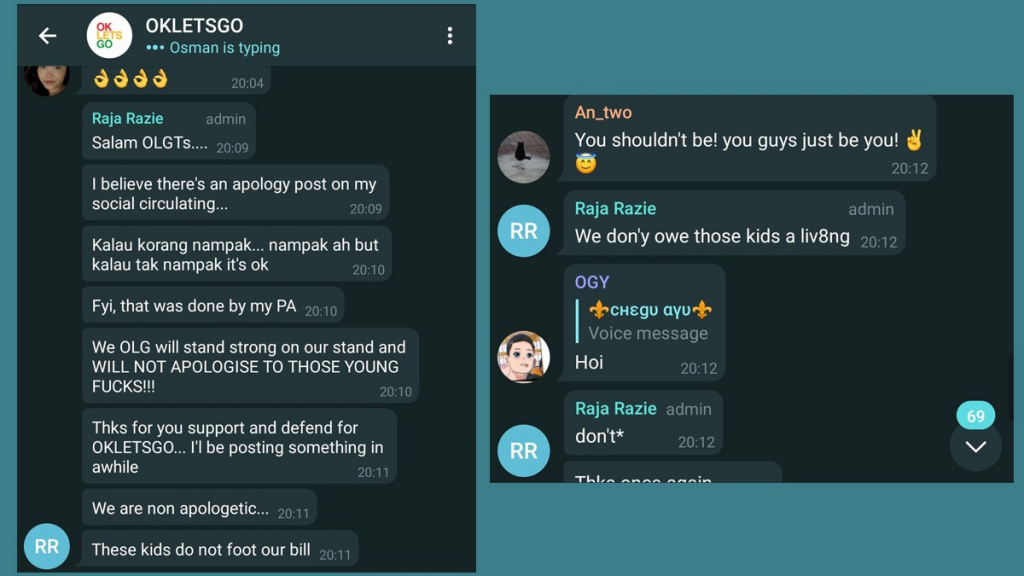
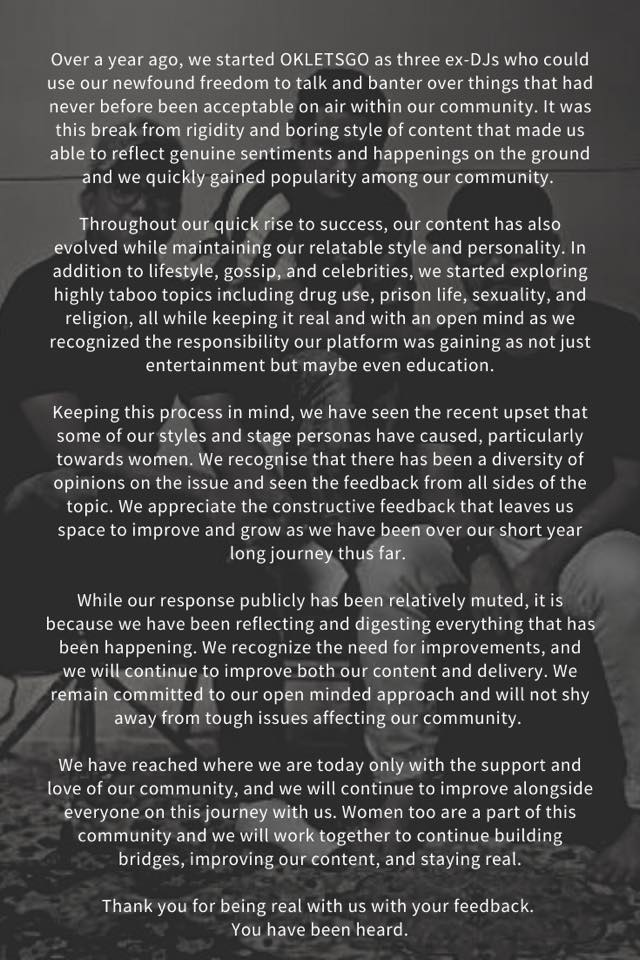
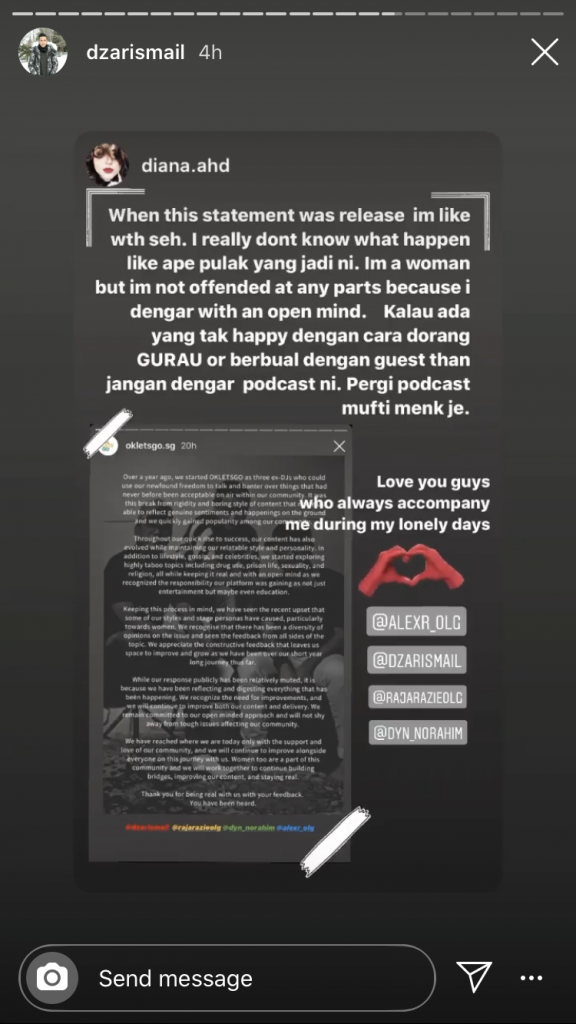
Moving Forward
If the OKLETSGO podcast should be allowed to continue, it is important for them to take genuine steps in improving themselves beyond the public platform. They should also further demonstrate their ‘realness’ in taking the following steps
1) Release a dialogue episode showing a genuine understanding of why they had to apologise. This should include a proper reflection by inferring examples from previous episodes.
2) Release an episode surrounding gender issues with a panel of experts.
3) Conduct extensive research surrounding ‘taboo’ topics before presenting issues on podcast episodes.
4) Provide further information on resources that listeners can access when handling sensitive issues.
5) A persistent commitment to ensure that fans continue this growth of improving with them and unlearn toxic behaviours that may have been perpetuated by OKLETSGO.
Translated by Zizie Izan.
This article was updated on 15th June 2020, 10:10pm SGT.

